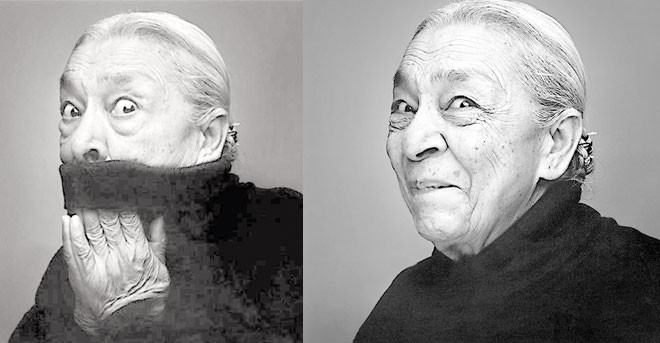

Zohra Sehgal passed away on July 10, 2014 at the grand old age of 102. But she wasn’t just any grand old lady or actress. She was also my mother’s phuppi, my grand aunt. And what a grand aunt she was.
She was, simply put, a legend. Her life was legendary too. Along with her sister, the equally wonderful Uzra Butt nee Mumtaz, she was a true trailblazer. Imagine, coming from fairly traditional Rampuri Pathan Muslim nobility (she was born Sahibzadi Zohra Begum Mumtaz-ullah Khan) and having the guts and the passion to challenge existing social mores and traditions in the 1930s to make theatre, dance and the arts your life. Both Zohra phuppi and Uzra phuppi worked first with Uday Shankar’s ballet company and then with Prithviraj Kapoor’s theatre company and were integral members of both groups. Amazingly, and fittingly, both would have quite the final acts to their careers (though, of course, Zohra phuppi’s was the more celebrated and well-known). There’s a movie just waiting to be made of their lives.
But I won’t list all of Zohra phuppi’s accomplishments (and awards) here. I’ll leave that to Wikipedia. I just want to talk a little bit about the impact she left on us, her family. She was just larger than life and you would get swept up in her energy when she would enter a room. Every moment – public or private – was a performance for her and, boy, did she bring the house down constantly.
When she came over from India to Lahore in 1993 to work in Ajoka Theatre’s production of Eik Thi Nani, a play written by Shahid Nadeem especially for her and her sister (Uzra phuppi was working extensively with Ajoka in those days), the whole city fell in love with her. Eik Thi Nani ran to packed houses and extra shows had to be added to accommodate the demand for tickets. For us it was a real family affair. Not only did it feature Zohra and Uzra phuppi but my cousin, Samiya (now a much in demand television actress) too while my mother, Zara, also had a small part in it (my mother’s cousin Salima took over her role when Eik Thi Nani was performed in India some years later). Through rehearsals and the performances, Zohra phuppi’s amazing vitality never flagged. She was in her 80s then but people decades younger than her found it hard to keep up with her. And she maintained the same vigour and verve and zest for life right up to the very end. The twinkle in her eye never dimmed and the cheeky little smile never faded. No wonder then that her rendition of Hafeez Jallundari’s ‘Abhi Tau Mein Jawan Hoon’ with which she would close her one-woman shows (during which she would also often recite one of my mother’s poems, Generations) would prove so popular. She believed every word of it and she made everyone believe it.
It was that same joyous and joyful approach to life which, I’m sure, contributed to her crossing a 100 years on this planet (yoga and good genes helped too, her father was also a centenarian). I think that she always had that same optimism and courage. Even when she was living on her own in a small little flat in London where I stayed with her once on my way to college in the States (during which she had told me how Prithviraj Kapoor had sent a young Shashi Kapoor to her for improving his Urdu, a prerequisite then for any would-be Bollywood leading man). Her career resurgence had yet to happen and it couldn’t have been easy for her at that point in her life but even then her cheerfulness never flagged, not even for a minute. So it was only right that the universe rewarded her sanguinity with so much success in the following years. That was why, not just professionally but (more importantly) personally, she was an inspiration to us all. She’s missed.
Read also: Aik thi Zohra by Sarwat Ali